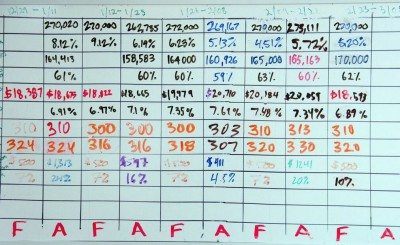 Mississippi Market
Mississippi Market
St. Paul, MN
Year founded: 1979
Equity investment: $90
Number of members: 15,500
Number of employees: 210
Retail locations: Selby Ave., West 7th, and Dayton’s Bluff opening Sept. 2015
It started with the results of an employee satisfaction survey. In 2012, Mississippi Market’s management learned some staff questioned the co-op’s growth plans, and they perceived it was having a negative impact on wages and the workplace. Managers realized that some of the concerns raised by staff in the survey were fueled by a lack of understanding of the business. In order to help address staff questions and concerns, managers decided to redouble their efforts to fully establish the Open Book Management (OBM) system at their co-op.
OBM is a way to engage staff in the process of sharing financial and operational information that empowers people to take an active role in the success of the business by setting goals they strive to meet. They hold each other accountable for reaching their goals. It requires a significant commitment from everyone at every level of the organization, but the rewards, if it is done well, are equally substantial. In the span of two years, OBM has transformed the work culture at Mississippi Market into one where people are focused on open communication, professionalism, and achievement as a business.
Scott McKell, the co-op’s human resource manager, said that OBM is not just about “reporting” information to staff but “generating new ideas going forward.” A big component of OBM implementation is having daily “huddles” in departments, which are meetings (anywhere from 10 to 45 minutes) that are focused on addressing various things like taking questions, providing information, sampling, and asking for ideas and feedback. They happen frequently so all staff get the opportunity to be informed and participate.
The first issue that staff and management tackled in 2013 with OBM was creating an equitable gainsharing program. It used to be those who were paid the most got the biggest bonuses, and now it is based on hours worked. “Basing gainsharing on hours worked is more equitable,” McKell said, “Now gainsharing means something to everyone. The margin, labor and sales budgets matter to staff. Open Book helps reinforce that everyone influences those factors.”
 One of the biggest changes, McKell noted, has been staff taking a vested interest. “Since we started OBM more people have moved out of the “just working here” camp. People have tools for understanding the way things work.” Now staff understand that growth means they have opportunities for professional advancement.
One of the biggest changes, McKell noted, has been staff taking a vested interest. “Since we started OBM more people have moved out of the “just working here” camp. People have tools for understanding the way things work.” Now staff understand that growth means they have opportunities for professional advancement.
Mississippi Market staff and management also learned better communication abilities through the process. Being direct and respectful can allow for difficult conversations that lead to solutions. “We’re starting to get used to the concept that being uncomfortable is just another step in the road. It might feel like you’re hurting the muscle in the short term, but you’re actually strengthening your skills,” McKell said.
McKell also believes that management’s commitment to listen and respond to staff concerns also contributed to a change in the co-op’s culture. Since Mississippi Market has two locations, and will be opening a third in September, the general manager and key co-op leaders continue to meet with all store teams through OBM to ensure communication flows both ways. “Trust is a two-way street. Managers can grow with the business the same way as front line staff. There’s a stronger sense that we’re all going the same direction.”
Have more questions?
Get in touch with one of our consultants.
